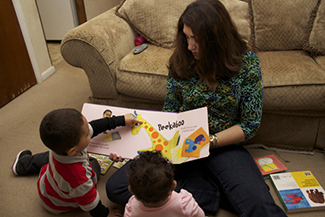Interdisciplinary Doctoral Leadership Training for Early Intervention
 The Schools of Communication Science and Disorders and Teaching and Learning at the FSU have a grant from the U.S. Department of Education, Office of Special Education Programs, to support leadership training of doctoral students in early intervention. The Leadership in Family Centered Early Intervention (LIFE) project is co-directed by Drs. Juliann Woods and Mary Frances Hanline and provides specialized leadership training in early intervention within a rigorous doctoral program in communication science and disorders and early childhood special education. Evidence-based practices are integrated into the program curricula to produce personnel with highly specialized skills and knowledge about research and the translation of research into practice, to address the unique needs of children and families served in their natural environments, i.e. home and community based settings. Each scholar also identifies an area of specialization such as autism, language disorders, or multiple disabilities to serve as a context for their research. The interdisciplinary community base commitment is evidenced by the biweekly seminars that interface with nationally recognized experts and state agency leadership personnel via technology to examine real world issues such as linguistic differences, implementation fidelity, personnel training on recommended practices and challenges in implementing and changing policy. Each doctoral scholar partners with a state leader to conduct research on implementation and utilization challenges. For example, the research conducted on coaching early intervention providers to use a parent implemented approach throughout the state of North Dakota using low cost technology will contribute to the coaching approach described in this proposal (Marturana & Woods, 2011.) The coaching framework, field-tested in five states, provided the first published data based research on the process (Brown & Woods, 2011; Friedman, Woods & Salisbury, 2012; Woods, Wilcox, Friedman & Murch, 2011). Professional development, technology use, and doctoral students trained in this program will be equipped to assume leadership roles in professional development, personnel preparation, research, and program and policy development in early intervention.
The Schools of Communication Science and Disorders and Teaching and Learning at the FSU have a grant from the U.S. Department of Education, Office of Special Education Programs, to support leadership training of doctoral students in early intervention. The Leadership in Family Centered Early Intervention (LIFE) project is co-directed by Drs. Juliann Woods and Mary Frances Hanline and provides specialized leadership training in early intervention within a rigorous doctoral program in communication science and disorders and early childhood special education. Evidence-based practices are integrated into the program curricula to produce personnel with highly specialized skills and knowledge about research and the translation of research into practice, to address the unique needs of children and families served in their natural environments, i.e. home and community based settings. Each scholar also identifies an area of specialization such as autism, language disorders, or multiple disabilities to serve as a context for their research. The interdisciplinary community base commitment is evidenced by the biweekly seminars that interface with nationally recognized experts and state agency leadership personnel via technology to examine real world issues such as linguistic differences, implementation fidelity, personnel training on recommended practices and challenges in implementing and changing policy. Each doctoral scholar partners with a state leader to conduct research on implementation and utilization challenges. For example, the research conducted on coaching early intervention providers to use a parent implemented approach throughout the state of North Dakota using low cost technology will contribute to the coaching approach described in this proposal (Marturana & Woods, 2011.) The coaching framework, field-tested in five states, provided the first published data based research on the process (Brown & Woods, 2011; Friedman, Woods & Salisbury, 2012; Woods, Wilcox, Friedman & Murch, 2011). Professional development, technology use, and doctoral students trained in this program will be equipped to assume leadership roles in professional development, personnel preparation, research, and program and policy development in early intervention.

